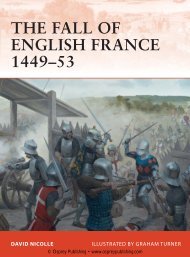Osprey - General Military - Knight - The Warrior and ... - Brego-weard
Osprey - General Military - Knight - The Warrior and ... - Brego-weard
Osprey - General Military - Knight - The Warrior and ... - Brego-weard
Create successful ePaper yourself
Turn your PDF publications into a flip-book with our unique Google optimized e-Paper software.
dttrnutir.'Xaefatrami r^Wuutrma erac. uuotmfa<br />
Ucer ipmf t^ffftguua uevt U o. (Sunt qtua ra<br />
feftxua catefcar iio^ 6Uo fotUtftna^rtetiofctfi<br />
taxtfturoittttlmWifftmof^io^x^xifron^ ' -<br />
imunctwfeft7.<br />
day of the battle. Even senior comm<strong>and</strong>ers were not immune to this kind of martial<br />
ardour. As Louis IX's army l<strong>and</strong>ed at Damietta, the king saw his banner reach the<br />
beach ahead of him. Picking up his shield he leapt into the surf <strong>and</strong> waded ashore <strong>and</strong>,<br />
on reaching it, enquired who the men on the horizon were. When he was told that<br />
they were Saracens he lunged forward desperate to attack them, <strong>and</strong> had to be<br />
restrained by more level heads, who suggested he wait lor the rest of the army to form<br />
up first.<br />
For all these reasons battle plans were generally kept very simple. Reserves were<br />
held under the direct control of the senior comm<strong>and</strong>er so that he might choose the<br />
time to commit them but also so that he was kept out of the immediate fight <strong>and</strong> could<br />
keep a broader perspective on the engagement. Any flank marches or delayed attacks,<br />
such as that by the second unit of French cavalry against the English baggage at<br />
Agincourt, had their timing <strong>and</strong> direction factored in before the engagement began.<br />
How did the knight feel in the midst of battle? What went through his mind? <strong>The</strong>se<br />
are perhaps the most fascinating of questions we can ask about medieval battle,<br />
but they are also the most difficult to answer. <strong>The</strong> medieval knight was not noted for<br />
his introspection <strong>and</strong> contemplation. Very few accounts of battle are written by men<br />
with martial experience, <strong>and</strong> those which are can disappoint. William of Poitiers,<br />
for example, who writes a highly partial history of the deeds of William the Conqueror,<br />
had been a knight in the duke's household at some point, but his narrative is heavily<br />
based upon classical texts <strong>and</strong> has almost nothing to say about the way the warrior felt,<br />
being more concerned with praising Duke William as a leader <strong>and</strong> William of Poitiers<br />
CAMPAIGN AND BATTLE -J*<br />
Walter d'Espec addresses<br />
the royal army before the<br />
battle of Lincoln, 1141.<br />
St<strong>and</strong>ing before him is<br />
King Stephen who was not<br />
a loud enough speaker to<br />
give the harangue himself.<br />
(Topfoto)<br />
127







